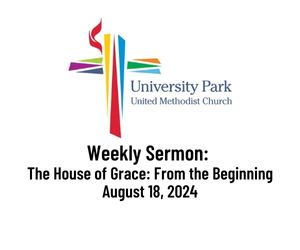The House of Grace: From the Beginning
University Park United Methodist Church
13th Sunday after Pentecost
August 18, 2024
Scripture: Colossians 1:15 – 20
Some people have occasionally accused me of procrastination. I don’t know why anyone would think this. I mean, my sermons are usually almost done by 7:00 AM on Sunday. I almost always register for the United Methodist Annual Conference at least three days before it starts. If you work in industry, maybe you’ve heard of “just in time” inventory management, or “short-cycle manufacturing.” See, I figure I’m not procrastinating. I’m practicing “short-cycle planning,” and “just in time scheduling.” This is not a character flaw, or at least that’s what I tell myself. It’s a cutting edge time management practice.
But I will say this: my practice of short-cycle planning has taught me some hard lessons over the years and it’s brought me to be at least a little better at planning ahead than I used to be. Compared to my younger self, nowadays I am the very model of meticulous planning and scheduling.
I remember being, I don’t know, 12 or 13 years old, something like that. My parents had tried to hammer into me the virtues of doing my schoolwork early, but it hadn’t exactly set in by that time. We had this big project in my biology class, or life science, or whatever it was called. We had to collect samples of all these different kinds of plants and then categorize them and label them and all that, and at the end of the semester turn in our collections. I had done a fair amount of work on this project, but I definitely underestimated how much I still had to go. So there I was, the day before the project was due, after school, hunting around in the woods behind my house, for the plants I had not yet found. I still had one or two more to go when night began to fall, which made it pretty tough to complete the assignment. And just as I was about to give up, there in the dark, I saw the beam of a flashlight, coming down the trail into the woods from the direction of my house. Carrying the flashlight was my father.
When he reached me, for a moment, he didn’t say anything. And then he said, “you know, this would probably be a lot easier if you’d done more work on it last week. In the daytime.” I said, “yeah. I know.” And then I said, “but Dad, this isn’t your mistake. I’m the one who put off the work. This is my problem. Why are you here?” He looked at me and he said, “I’m your father.”
Years later, when my children were growing up, I thought about that moment every once in a while. As parents, we try to strike this delicate balance between supporting our kids on the one hand, and letting them learn from the consequences of their decisions on the other. It’s never an easy balance to find. And you could argue that my dad made a parenting mistake by not abandoning me to the consequences of my lack of planning. But for me, that moment was pivotal.
My dad was an agnostic until the day he died. He was never a religious man. But in that moment, he taught me more about grace than I would learn from all my years of childhood Sunday School. Walking through the woods, in the dark, looking for me, carrying a light for me. My father could no more have turned away from me than the sun could have failed to rise the next morning. That deal was done at my birth, or for that matter probably even before.
I know we don’t all have the experience of grace-filled families, and even the most wonderful families are not grace-filled all the time. We’re human. We do the best we can in the moment. We make lots of mistakes. But I think if we’re fortunate enough to have even one or two episodes like that growing up, we can begin to see something the early church realized about the God they knew in Christ. We can begin, as they did, to see something important about the way creation is knitted together.
Today, I’m beginning a four-week sermon series on the Christian concept of grace. And even though I’ve just finished five weeks focusing on an essay written by John Wesley, who was the primary founder of Methodism, I do want to spend a little time more time with Wesley through this series by reflecting on the way that he understood grace.
Let me just say first that grace is one of those deceptively simple ideas that turn out to have much bigger implications than you might imagine at first. If you’ve ever been through a confirmation class, or studied the basic ideas of Christian faith as an adult, or even if you’ve just hung around churches for a while, you’ve probably heard the basic definition of grace: grace is God’s unmerited favor.
Another way of saying it might be that grace is how God loves: grace is God’s love for us and creation that is completely unrelated to our merit or what we deserve. Merit and grace simply have nothing to do with each other.
If Christianity could be said to have one central idea, that idea is grace. God, the almighty creator of the universe, maker of heaven and earth, ultimate source of all goodness and wisdom and life, loves each one of us not only more than we imagine, but more than we can imagine – not because we’ve earned it or proven ourselves worthy or done something to deserve it, but just because that’s who God is. Grace is not just one among God’s many traits. Grace is the character of God. This is why the Book of First John says that God is love, and those who abide in love abide in God.
Now that’s not such a hard idea to wrap our minds around intellectually. In fact, it’s kind of a cliché, right? We’ve all heard this a million times. God loves you. Great. In that form, it’s almost become meaningless. But to really come to grips with grace emotionally and spiritually, to truly let it in and let it work on us, that’s hard. Because grace runs counter to everything we’re taught about how the world works, and sadly, too often it runs counter to what the world tells us about ourselves. It is too easy to believe there’s something fundamentally wrong with us, that if God really saw who we were, then God couldn’t possibly love us. We’re told in a million ways, from advertising to watching everyone else’s picture perfect life on social media, that we should be ashamed; that something is missing; we’re lacking; we’re being judged and found wanting. And even if somehow we’re immune to that kind of toxic message, even then the way we’ve organized our society teaches us nothing’s free; we earn our way in the world. We’re taught that in a perfect world everyone would get what they deserve. Basic fairness demands it, even though thinks don’t always work out that way.
Grace, though, grace stands all that ideology on its head. Grace is the idea that God is not fair, God is extravagantly unfair, God wants to give us more than we deserve, more than we could ever possibly earn. And God wants nothing in exchange except our well-being. In God’s eyes, we are beloved and treasured and innately worthy for absolutely no reason beyond the fact that we exist – without doing or earning or achieving anything.
For John Wesley, grace was the essence of God. And he saw grace working in three ways – or you might say four, and I’ll talk about that over the next few weeks. But the first way, the one I want to focus on this morning, is what Wesley called “prevenient grace.” Prevenient grace is the grace woven through our lives before we know anything about it. It’s like my Dad with that flashlight. My Dad loved me long before I ever saw that beam of light, coming through the woods toward me. I knew that. His love had been with me all my life. Prevenient grace is God’s love working in the world before we know it. Prevenient grace is why we have a conscience; it’s why we have this idea that there’s an important difference between right and wrong. Prevenient grace is God awakening a yearning for God in us in the first place. God has always loved us. We just might not have noticed.
Wesley did not invent this idea. Augustine wrote about it in the fourth century, and he was borrowing from theology that came before him. The first page or two of his classic work Confessions contains the most famous line Augustine ever wrote: “you have made us for yourself, O God, and our hearts are restless until we find our rest in you.” Augustine’s writing about a lot of things there, but one of them is prevenient grace: God has always been with us. God has always been for us, even though we may not have known it.
This morning, we heard a reading from the Book of Colossians. Scholars believe the passage we heard started out as a hymn. It would have been sung in some of the very earliest Christian worship. So this wasn’t some arcane piece of theology no one understood. It wasn’t some abstruse technical jargon a scholar wrote sitting in a library. This was a song Christians sang together in worship. And in it, the early church made a powerful claim about Jesus:
“He is the image of the invisible God…in him all things in heaven and on earth were created…He himself is before all things, and in him all things hold together…”
For those early Christians, singing this beautiful poetry in worship, Jesus was not just an emissary sent from God. Jesus was God. And the self-giving love we see in his life: the desire to heal, the desire for all people to have life abundantly, that love is what created the universe. In him all things hold together.
Those first Christians looked at Jesus, the traveling wisdom teacher, the Galilean Jewish peasant who gave his life so others might live, and there they saw God. Forgiveness, reconciliation, God’s commitment to us is accomplished because the Christ-spirit, the spirit of love giving itself so others might have life, that is the character of God, and it’s been woven into creation since the beginning. When we act in grace-filled ways, shining a light for them, then God’s life is being lived through us. And the grace we show others is part of God’s grace, drawing the world closer, doing the slow, patient work of healing and reconciliation. As we practice living by grace, we will know God.
Each week of this series, I’m going to close with a couple of questions. I don’t need to know the answers, although if you want to share them with me I’d love to hear them. They’re just for us to think about. So today, let me ask this: how has God been active in your life before you knew it? How has God guided and loved you when you were unaware? How have you extended grace to others?



Leave a Reply